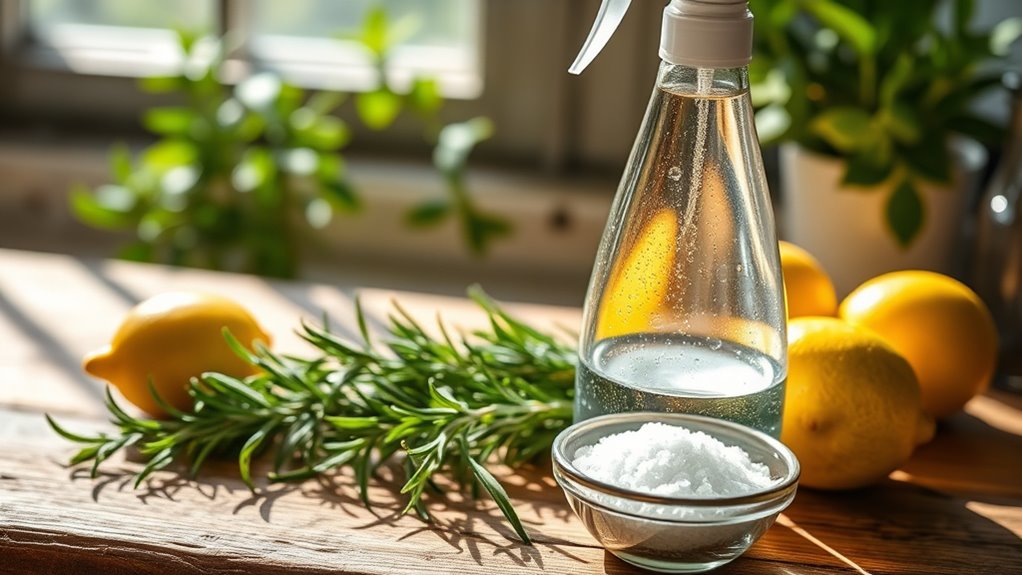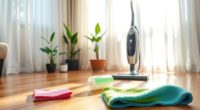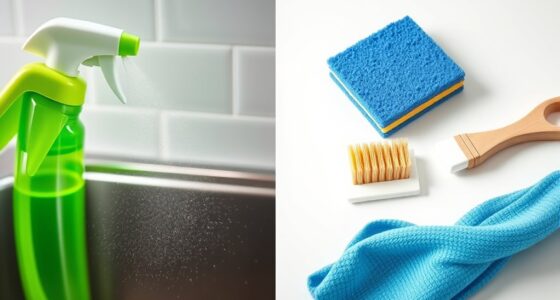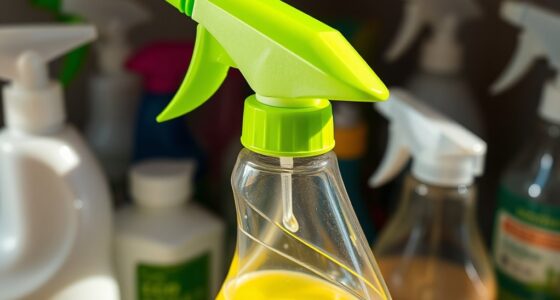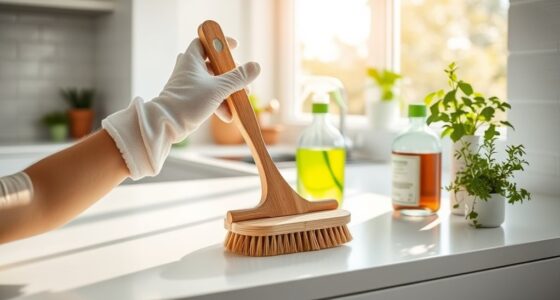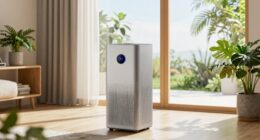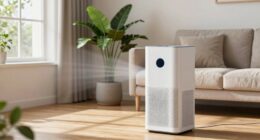To make your own natural disinfectant, mix 1 cup distilled water, 1 cup distilled white vinegar, and 2 tablespoons of rubbing alcohol in a glass spray bottle. You can add a few drops of essential oils for a pleasant scent if you’d like. Shake well before use and spray on surfaces, allowing it to sit for at least one minute. Store your disinfectant in a cool, dark place, and keep it handy to learn more about effective cleaning practices.
Key Takeaways
- Mix 1 cup of distilled water, 1 cup of distilled white vinegar, and 2 tablespoons of rubbing alcohol in a glass spray bottle.
- Add optional essential oils for antimicrobial properties and pleasant scents; shake well before each use.
- Spray the disinfectant on surfaces and let sit for at least one minute for effective disinfection.
- Ensure good ventilation during use and store the mixture out of reach of children and pets.
- Label and date your disinfectant bottle, and store it in a cool, dark place for optimal freshness.
Ingredients & Supplies Needed
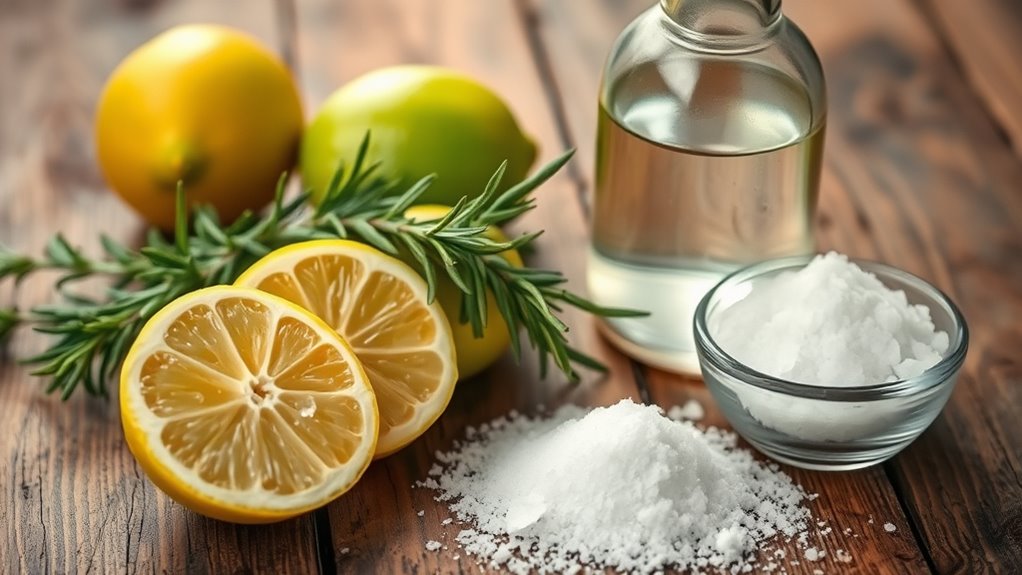
Creating your own disinfectant is simple and effective. To start, gather the essential ingredients & supplies needed: distilled white vinegar, vodka or rubbing alcohol (at least 60% alcohol content), and distilled water for a longer shelf-life.
You’ll also want a glass spray bottle for storage, as it’s reusable and easy to clean. For added antimicrobial properties and a pleasant scent, consider incorporating essential oils like tea tree, lemon, or lavender. Just remember to check their safety around pets before using them.
A recommended mixture includes 1 cup of water, 1 cup of vinegar, and 2 tablespoons of rubbing alcohol. With these natural disinfectants, you’ll create a powerful cleaning solution that keeps your home fresh and safe.
Step-by-Step Directions
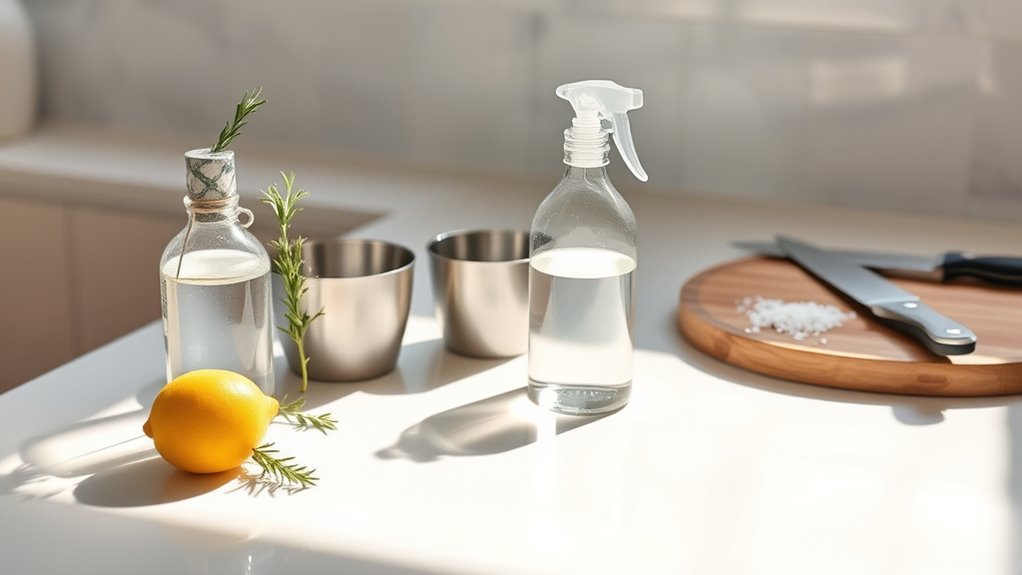
To make your own disinfectant, start by combining the ingredients in a glass spray bottle. Mix 1 cup of water, 1 cup of distilled white vinegar, and 2 tablespoons of rubbing alcohol. Add 20 drops of essential oils like lemon and tea tree oil to boost the natural cleaning power and scent. Secure the lid on the spray bottle and shake well to mix thoroughly before each use.
| Step | Action |
|---|---|
| Combine Ingredients | Water, vinegar, alcohol, oils |
| Shake | Mix well before each use |
| Spray | Apply to surfaces, wait 1 minute |
Store your disinfecting spray in a cool, dark place and label the bottle to maintain freshness.
Essential Oil Options

Adding the right essential oils can enhance your homemade disinfectant’s effectiveness and scent.
Tea tree oil is a powerful natural disinfectant, known for its ability to combat bacteria, fungi, and viruses. This makes it an excellent choice for your cleaning solutions. Regular use of essential oils like tea tree can promote a healthier home environment. Additionally, using juice cleanses can support overall wellness and reduce exposure to harmful chemicals. It’s important to note that certain oils can be toxic to pets, so always ensure their safety when using them.
Tea tree oil is a potent natural disinfectant, effective against bacteria, fungi, and viruses, making it ideal for cleaning solutions.
You might also consider adding lemon juice or other citrus oils, which not only provide a fresh aroma but also have natural antibacterial properties that help break down grease and kill germs effectively.
For an extra germ-fighting boost, blend essential oils like cinnamon, eucalyptus, and clove.
Just remember to check the safety of your chosen oils around pets, as some, like tea tree and citrus, can be harmful.
Incorporating these oils can elevate your mood and improve indoor air quality! Additionally, using natural disinfectants can be beneficial for overall health by reducing exposure to harsh chemicals.
Safety Considerations
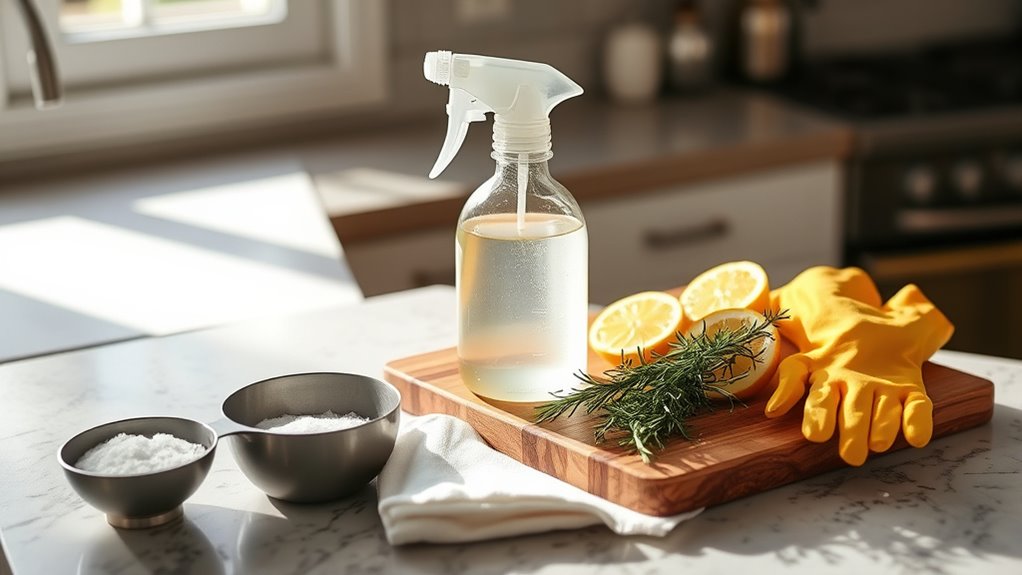
When you make your own disinfectant, it’s essential to guarantee good ventilation to avoid inhaling any fumes.
Always store your disinfectants out of reach of children and pets to prevent accidents.
Additionally, be careful not to apply your mixtures on sensitive surfaces like marble or granite, as they can get damaged.
Ventilation During Use
Good ventilation is essential while using disinfectants, as it helps reduce the concentration of potentially harmful fumes. To guarantee proper ventilation during use, open windows and doors to promote fresh air circulation.
If you’re in a smaller or enclosed space, use exhaust fans to disperse strong odors and maintain air quality. If you’re sensitive to cleaning product smells or have respiratory issues, consider wearing a mask to minimize inhalation of harmful vapors.
Avoid using disinfectant sprays in poorly ventilated areas; this can lead to harmful vapor buildup, causing dizziness or respiratory discomfort.
Finally, let the disinfectant air dry on surfaces instead of wiping it off immediately, ensuring better efficacy and reducing your exposure to fumes.
Safe Storage Practices
Proper ventilation during the use of disinfectants is only half the battle; safe storage practices are just as important to guarantee your homemade solutions remain effective and secure.
Store your homemade natural disinfectant in a cool, dark place away from direct sunlight to maintain its potency, especially if you’re using essential oils. Use a glass spray bottle for storage, as it’s reusable and won’t leach harmful chemicals.
Be sure to label and date your disinfectant, so you can track its freshness—ideally using it within a month. Always seal the bottle tightly to prevent evaporation and contamination.
Finally, keep your disinfectant out of reach of children and pets, and store it in a well-ventilated area to avoid inhaling fumes.
Avoiding Sensitive Surfaces
How can you guarantee your homemade disinfectants don’t damage your surfaces?
First, avoid using vinegar-based solutions on sensitive surfaces like granite and marble. The acidity can etch and permanently damage these materials over time. Additionally, be mindful that the use of certain substances in homemade cleaners can contribute to air pollution if not handled properly. Maintaining a proper budget for cleaning supplies can help ensure you purchase the right ingredients without overspending.
Always test a small, inconspicuous area before applying any disinfectant. This confirms there’s no discoloration or harm.
While rubbing alcohol and vodka work well as disinfectants, use them cautiously on painted or finished surfaces to prevent stripping or fading.
For delicate fabrics, consider fabric-safe disinfectants or check manufacturer guidelines.
Finally, ensure good ventilation when working with alcohol-based solutions to avoid inhaling strong fumes, especially in enclosed spaces. Additionally, be aware that certain environmental factors can influence the effectiveness of your disinfectant solutions, making it essential to choose the right ingredients based on your specific needs.
Protect your surfaces while keeping your environment clean!
Uses for Disinfectant Spray Cleaner

When you use a disinfectant spray cleaner, you’re not just killing germs on surfaces; you’re also eliminating unpleasant odors that can linger in your home.
Plus, with natural ingredients, you can feel confident that it’s safe for your pets.
Let’s explore how these benefits can enhance your cleaning routine.
Surface Disinfection Benefits
Here are three key benefits of surface disinfection:
- Germ Elimination: Natural cleaners, like those with distilled white vinegar, can kill up to 99% of bacteria and 82% of mold.
- Safe for All: These sprays are a safer alternative for households with children and pets, reducing exposure to harsh chemicals.
- Improved Air Quality: Regular use of natural disinfectants helps maintain better indoor air quality, avoiding respiratory issues linked to chemical-based products. Additionally, incorporating essential oils like tea tree and lemon not only boosts the scent but also provides additional antimicrobial properties for effective surface disinfection.
Odor Elimination Properties
Many people underestimate the power of a good disinfectant spray in tackling unpleasant odors around the home. Natural disinfectants made with vinegar or essential oils not only clean surfaces but also neutralize odors effectively. Citrus essential oils like lemon and orange are particularly potent, breaking down unpleasant smells while disinfecting. Additionally, using natural ingredients such as baking soda can enhance the effectiveness of your cleaning routine, as it also absorbs and neutralizes odors. Incorporating a vegetarian diet can also contribute to a healthier home environment by promoting the use of natural, unprocessed foods that reduce the need for harsh chemicals.
Here’s a quick overview of some effective ingredients for odor elimination:
| Ingredient | Odor-Cleaning Properties | Bonus Benefits |
|---|---|---|
| Baking Soda | Absorbs and neutralizes | Deodorizes naturally |
| Tea Tree Oil | Antimicrobial | Pleasant fragrance |
| Hydrogen Peroxide | Kills odor-causing bacteria | Safe and effective |
Using a good disinfectant spray regularly can enhance your indoor air quality, making your living space more inviting. Additionally, using whole, unprocessed foods in your diet can contribute to a healthier home environment by reducing the need for harsh chemicals.
Safe for Pets
Using a safe disinfectant spray is particularly important for households with pets. You want to guarantee that your cleaning routine is effective yet gentle on your furry friends.
Here are three key tips:
- Choose pet-safe essential oils: Opt for oils like lavender and tea tree, which have antimicrobial properties but are safe for pets.
- Use nontoxic ingredients: Ingredients like distilled white vinegar and vodka are effective against germs without harmful effects on your pets.
- Test before use: Always test the spray on a small area and let it dry completely to avoid any residues that could irritate your pets.
DIY Natural Disinfectants
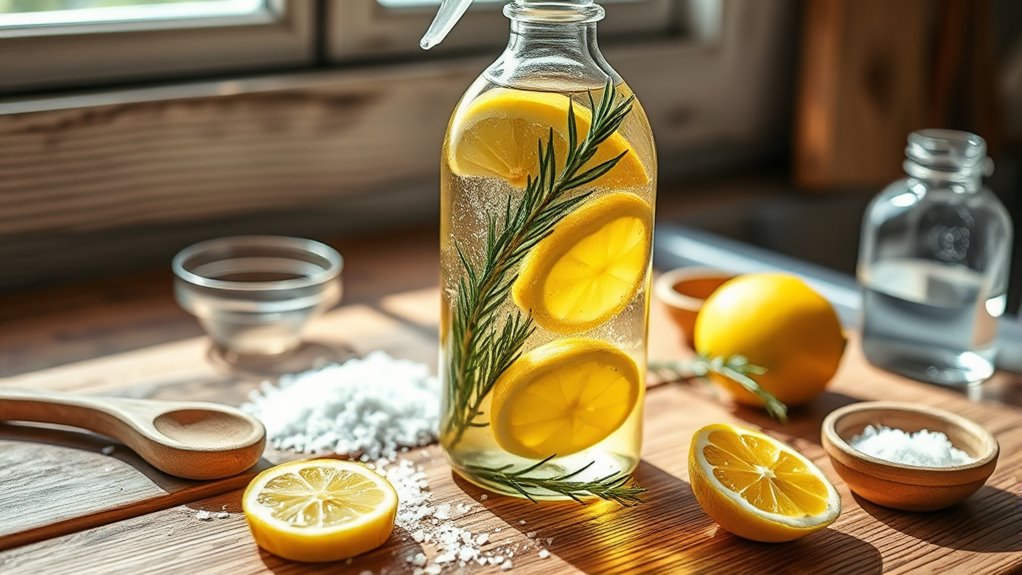
Creating your own DIY natural disinfectants not only helps you maintain a clean home but also allows you to avoid harsh chemicals found in commercial products.
A simple homemade all-purpose cleaner can be made using 1 cup of water, 1 cup of white vinegar, 2 tablespoons of rubbing alcohol, and 20 drops of essential oils like lemon and tea tree.
These essential oils not only add a fresh scent but also provide antimicrobial properties that combat bacteria and viruses. Verify your alcohol content is at least 60% for effective germ-killing action.
Store your disinfectant in a glass spray bottle and keep it out of reach of children and pets, guaranteeing a safe and clean environment for everyone.
Benefits of Natural Disinfectants
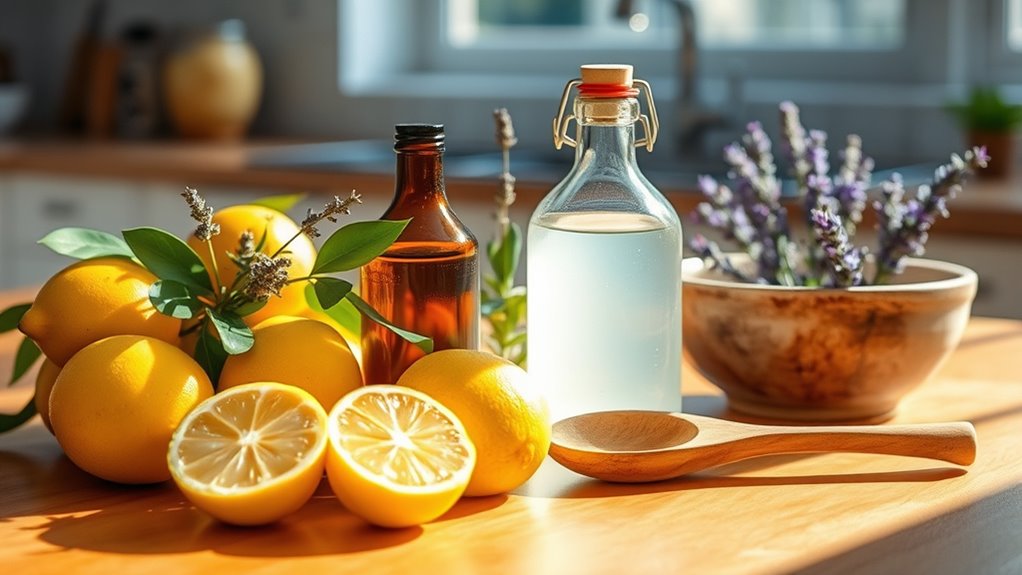
Switching to natural disinfectants can create a healthier home environment for you and your loved ones.
These eco-friendly cleaning solutions not only reduce your exposure to toxic chemicals but also help improve indoor air quality.
Healthier Home Environment
While many conventional disinfectants can effectively eliminate germs, they often introduce harmful chemicals into your home.
Natural disinfectants, made with eco-friendly ingredients like vinegar and essential oils, promote a healthier indoor environment without the risks associated with toxic chemicals. Additionally, using natural products can help support emotional well-being in households that include individuals with conditions like dementia or Parkinson’s. Engaging in the process of making these natural solutions can also serve as a form of self-care that enhances your mental health.
Here are three key benefits of using them:
- Safer for Families and Pets: You reduce the chance of respiratory issues and skin irritations.
- Improved Air Quality: Regular use minimizes volatile organic compounds (VOCs), making your home more pleasant.
- Environmental Impact: These biodegradable products align with greener cleaning standards, decreasing chemical exposure. Additionally, using natural disinfectants can help minimize allergens and pollutants, contributing to better overall health and wellness.
Eco-Friendly Cleaning Solutions
Choosing natural disinfectants not only enhances your home’s safety but also opens the door to a range of eco-friendly cleaning solutions that boast impressive benefits.
By using natural disinfectants like vinegar and essential oils, you effectively kill germs without relying on harsh chemicals that can harm your family and pets. These eco-friendly cleaning solutions improve indoor air quality by eliminating toxic fumes, making your home a healthier space. Regular use of these disinfectants can lead to improved respiratory health, especially for those with allergies or asthma. Additionally, maintaining a clean environment contributes to overall health, as it reduces the risk of illness and promotes well-being. Moreover, many essential oils possess natural antibacterial properties, which can enhance the effectiveness of your cleaning routine.
Plus, many of these natural options are biodegradable, minimizing their environmental impact. Ingredients such as vinegar and hydrogen peroxide not only disinfect but also cut through grease and neutralize odors, offering a multi-functional approach. Additionally, incorporating essential oils for antimicrobial properties can further enhance the effectiveness of your natural disinfectant.
Tips for Storing Your Disinfectant
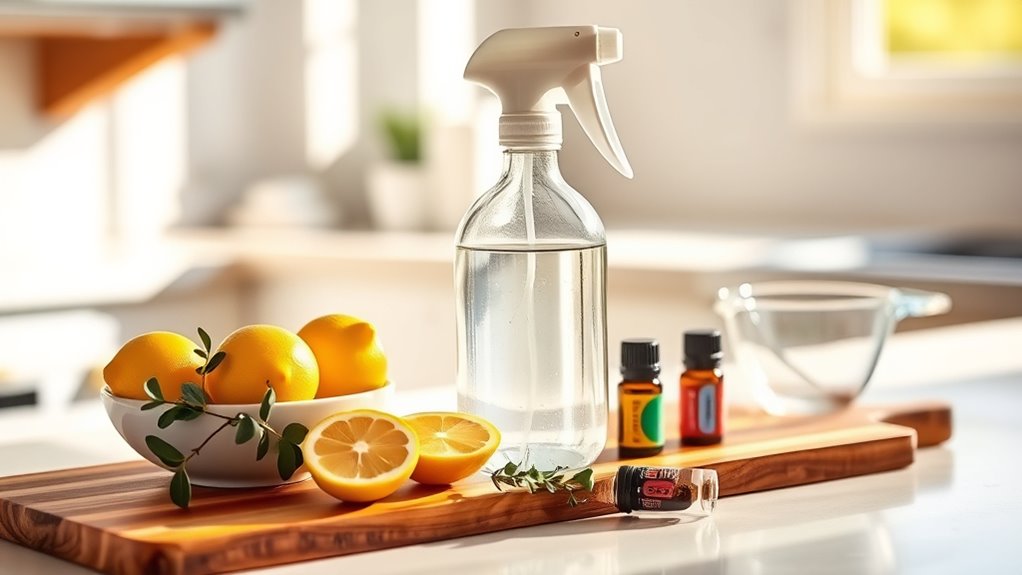
To guarantee your homemade disinfectant remains effective for as long as possible, store it in a cool, dark place away from direct sunlight.
Here are some tips to help you store your natural cleaning products effectively:
- Use a glass spray bottle: This reduces plastic waste and guarantees no residual chemicals affect future uses.
- Label and date your disinfectant: Keep track of when it was made to monitor its freshness and potency.
- Seal it properly: Ensure the spray bottle is tightly sealed to prevent evaporation of essential oils and alcohol, which are vital for the disinfectant’s efficacy.
If you’re using water, opt for distilled water to enhance shelf life.
Cleaning Surfaces Effectively
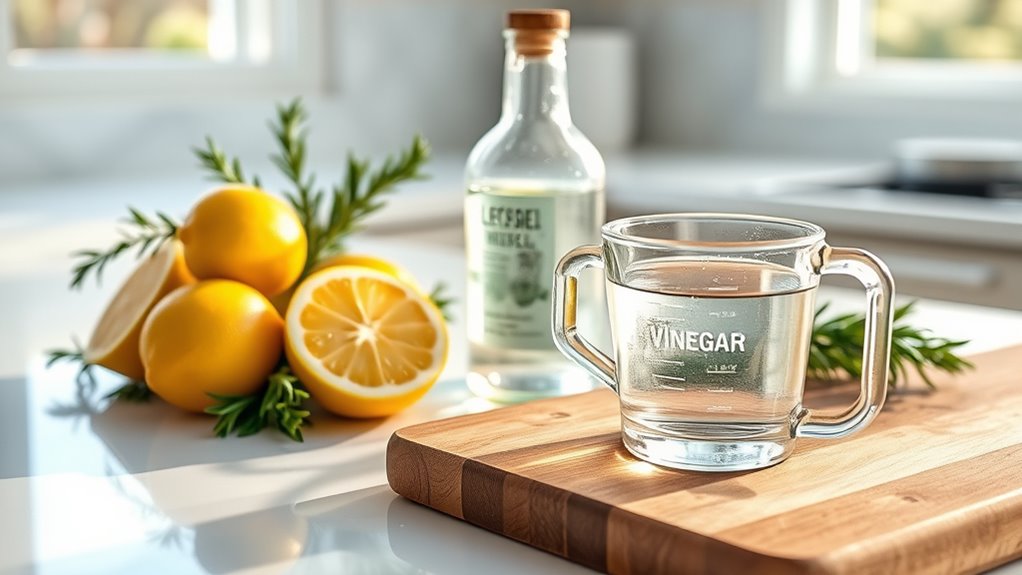
Cleaning surfaces effectively requires a systematic approach, guaranteeing that dirt and germs are properly addressed.
Start by wiping away visible dirt and debris with a damp cloth; this step prepares the surface for your cleaning spray. After cleaning, apply your natural disinfectant liberally and let it sit for at least one minute to kill germs and bacteria effectively.
Use separate cloths for different areas, like kitchens and bathrooms, to prevent cross-contamination. Focus on high-touch areas, such as doorknobs and light switches, using a product with at least 60% alcohol for maximum effectiveness.
Don’t forget to guarantee good ventilation during cleaning, especially with alcohol-based disinfectants, to minimize inhalation of strong fumes while you clean your home.
Additional Resources and Information
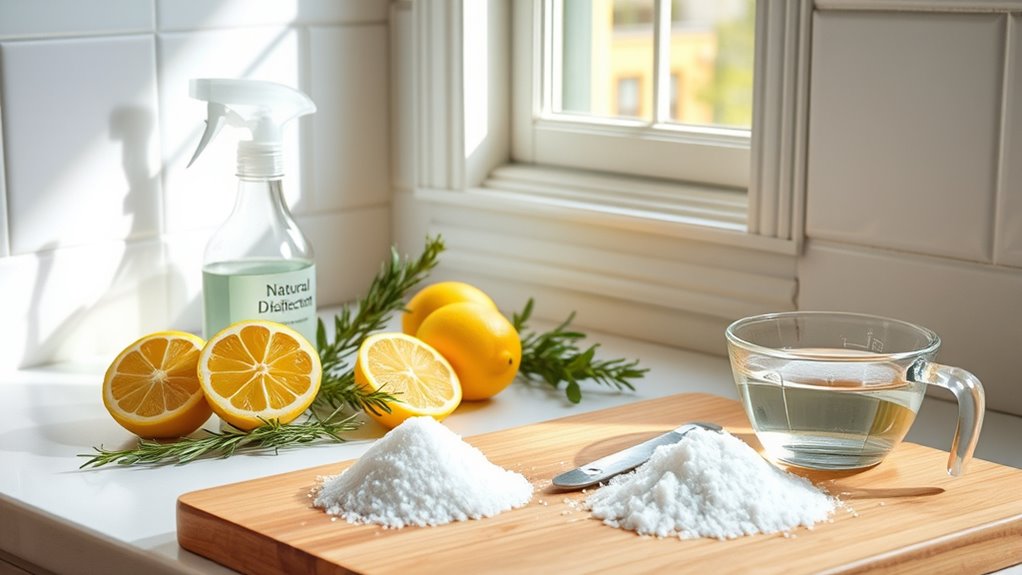
After ensuring your surfaces are clean and ready for disinfection, you might want to explore additional resources that can enhance your DIY cleaning efforts.
Explore valuable resources to elevate your DIY cleaning efforts and ensure a safe, effective disinfection process.
Here are three valuable resources:
- EPA Guidelines: Learn how to identify greener cleaning products and avoid toxic chemicals commonly found in conventional cleaners.
- CDC Recommendations: Discover effective disinfecting methods that boost the safety and efficacy of your natural disinfectants.
- Clean Mama’s Website: Find updated cleaning recipes and tips for creating tailored homemade cleaners using essential oils like tea tree and lavender, along with natural ingredients like vinegar and lemon.
These resources will help you maximize the effectiveness of your homemade cleaners while keeping your space safe and healthy.
Happy cleaning!
Frequently Asked Questions
What Is the Most Effective Homemade Disinfectant?
The most effective homemade disinfectant combines simple ingredients you probably have at home.
Mix equal parts of water and distilled white vinegar, then add two tablespoons of rubbing alcohol (at least 70% concentration).
You can boost its cleaning power by including 20 drops of essential oils like tea tree or lemon.
Remember to let the solution sit for at least a minute on surfaces to maximize its germ-killing effectiveness.
Store it in a glass spray bottle.
What Is the Most Powerful Natural Disinfectant?
Did you know that hydrogen peroxide can kill up to 99.9% of bacteria and viruses when used properly?
When it comes to natural disinfectants, hydrogen peroxide stands out as the most powerful option. Its effectiveness against a wide range of pathogens makes it a go-to choice for many.
Remember to use a concentration of 3% or higher for best results, ensuring your surfaces stay clean and safe from germs.
What Is the Best Way to Disinfect Naturally?
When you want to disinfect naturally, consider using white vinegar mixed with essential oils for extra antimicrobial power.
Vinegar’s acetic acid effectively kills many bacteria. You can also try hydrogen peroxide at a 3% concentration, letting it sit for about 30 minutes before wiping.
Remember to clean surfaces of dirt first, as it helps the disinfectant work better.
With these methods, you’ll create a safer environment without harsh chemicals.
Does Vinegar Actually Disinfect?
Imagine you’re cleaning your kitchen after a big family dinner. You reach for vinegar, thinking it’ll disinfect your countertops.
While vinegar does have some antibacterial properties due to acetic acid, it isn’t a registered disinfectant. It can reduce bacteria, but it won’t effectively tackle stronger pathogens like the flu virus.
For a more powerful solution, consider mixing vinegar with alcohol, but remember to avoid using it on marble or granite surfaces.
Conclusion
Now that you know how to create your own natural disinfectant, imagine spritzing your homemade cleaner on a kitchen counter just as you’re about to chop fresh veggies for dinner. The invigorating scent of essential oils fills the air, and you feel good knowing you’ve chosen a safe, effective option for your family’s health. With your disinfectant in hand, you’re ready to tackle any mess life throws your way, all while embracing the power of nature in your home.

